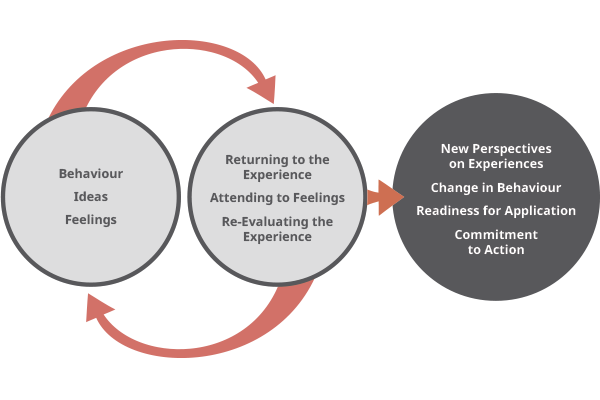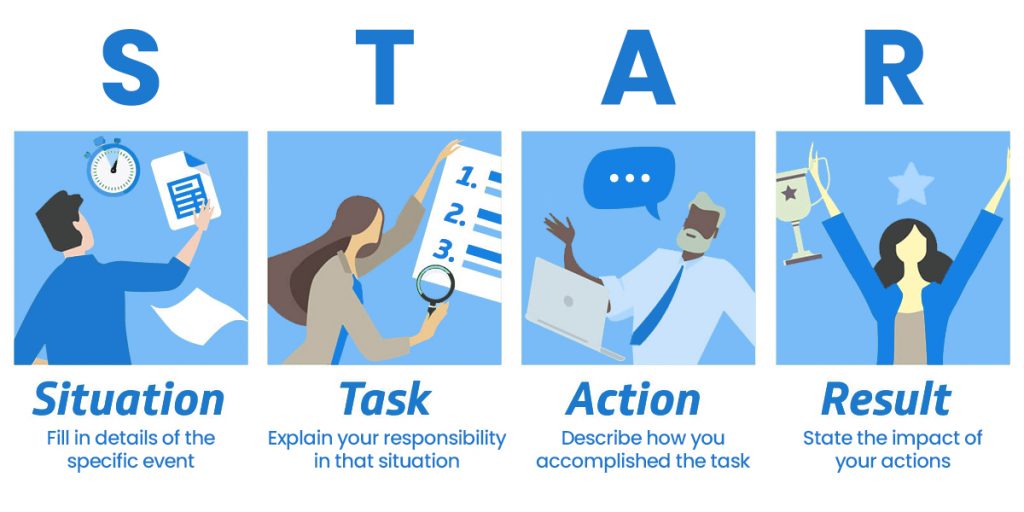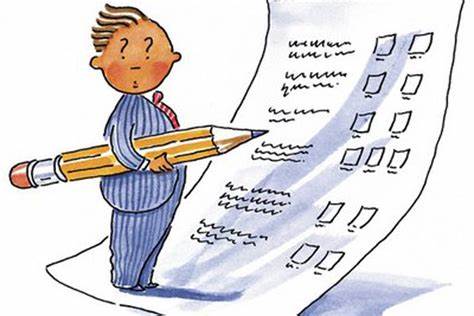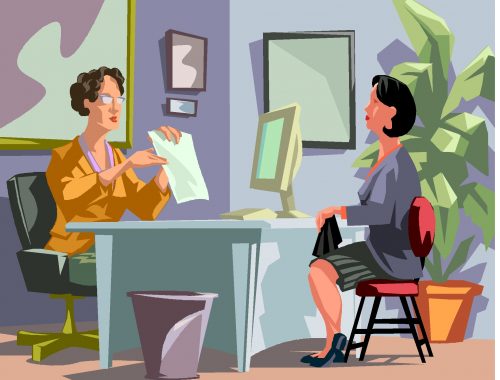Interview? Interview!
“Sitting in front of the desk, sweat beaded on your forehead, uncontrollable shaking in your legs.”
This is a common sentiment of those who dread going to job interviews. Going to a job interview is definitely nerve-wracking, especially if it’s your first time. I recently experienced a simulated job interview and although the setting was much less intimidating than a real job interview, I still felt my stomach knotting up in anticipation. But this simulated interview helped me understand interview mechanics and plan methods to overcome common interview obstacles. In this blog, I’ll use Boud’s reflective model to analyze my preparation experience and explore the new insight I gained through this simulated interview.

Facing the Unknown
I was feeling a serious case of the jitters when I got news that our class would have to do a simulated job interview. Not only did I worry about thinking on my feet in front of everyone else, but also getting tongue-tied and hearing critical feedback afterward. Fortunately, I took measures to break out from this dread by reading a book called ‘ Ten Minute Guide to Conducting a Job Interview ‘ (Larson) so that I could be more prepared – these strategies actually worked wonders and relieved my anxiety before the big day arrived.
The first step in getting ready for an interview is to analyze the position. Introspective investigation in analyzing the job is the process that “embarking on a systematic review of the job” (Larson 4) helped me to be more focused on the job itself and discover what I need to prepare for the role. Through investigating the BBC production advanced trainee scheme (My chosen position), I was able to gather a lot of information about the job, from its requirements to its peculiarities. After learning the basics of the role, I realized that this is precisely what I want and what I’m qualified for. As I learned more about my job and myself, I found that the uneasiness in my heart began to subside, and I began to feel more confident.

Secondly, preparing the answers for the interview questions is the essential way to make yourself stay calm and be more confident about the simulated interview. (Yate 95) The STAR method has been a total lifesaver in this process: giving specific examples of incidents, describing activities with detail, and assessing outcomes – it’s the perfect formula for answering behavioral inquiries. With this technique, I found my own unique selling points that made me feel much more prepared for my practice interview.
Finally, practicing your answers in advance can also be beneficial (Yate 97). It has always bothered me that I don’t feel very confident in my ability to express myself. I worried that no matter how well I prepared for the interview, I still wouldn’t be able to prove my ability. Practicing potential questions beforehand with my friends and family members made me feel more confident in answering questions during the actual simulation. In addition, I was able to observe my body language and get an understanding of how to make myself more engaging when responding to questions in the interview.
D-Day Makes My Day
At first, I was anxious about the interview, but after practicing for it in various ways, I felt at ease during the mock interview. Reflecting on my interview experience, I realized how much I enjoyed the interview itself. It helped me feel more prepared for the actual job interview in the future, and it showed me how to calm my nerves and be relaxed throughout the interview. This simulated interview helped me master the STAR method. With this method, I was able to articulate my thoughts more precisely in response to interview questions, significantly enhancing my communication skills. After reading the feedback from my peers, I realized that my earlier concerns were unfounded and that I had just been unprepared.

Reflecting on the feedback strengthened my confidence for the interview, I had confident body language and eye contact during my interview. In my responses to the questions, I did a good job of proving my interest in the job and making effective use of the STAR method. The criticism I received from my peers also made me realize my shortcomings. For instance, during the interview, I didn’t give many instances connected to my technical skills. This made it possible for me to see my limitations in terms of preparation for the interview, and it provided me with the chance to enhance my skills in advance of subsequent interviews, which ultimately contributed to the positive outcomes of those interviews.
Get Ready, Stay Stunning

I learned that simulated interviews are a useful way to prepare for and make you more confident about your job interviews in the future. Because of this, I am now more confident than I was before sharing specific personal experiences when answering questions about my technical skills. At the same time, I have a better understanding of the interview process, which has helped me calm my anxiety and ensured I’m prepared.
Moreover, I was able to better re-evaluate myself, including the skills I already possess as well as the skills I need to develop further. For instance, I am not nearly as lousy with words as I had expected. Instead, when I talk with the team members in the simulated interview group, they believe that I am a good talker and that I am able to show my passion and positive energy in an interview effectively.
Furthermore, I did apply what I learned from the simulated interview to real-world practice – I did a job interview right after this experience and I nailed it. I was able to put the knowledge and skills I gained from the simulated interview into the actual interview. The interviewers were impressed by my self-assurance and appreciated the abilities I showed in my personal experience. I’m ready to start my new position and stay stunning in my future interviews.
“Likeability, whether in an interview or in your day-to-day life, is a big deal.”
(Zacher 16)
References:
Boud, David. Reflection: Turning Experience into Learning: Turning Experience into Learning. Kogan Page, 1985.
Larson, William W. Ten Minute Guide to Conducting a Job Interview. Alpha, 2000.
Yate, Martin John. Great Answers to Tough Interview Questions. Kogan Page, 2021.
Zacher, Christopher. “WINNING TIPS FOR JOB INTERVIEWS.” Hispanic Engineer and Information Technology, vol. 33, no. 1, 2018, pp. 16–17. JSTOR, http://www.jstor.org/stable/26448979. Accessed 20 Feb. 2023.
Video References:
“How to Ace a Job Interview: 10 Crucial Tips.” Performance by Thomas Frank, YouTube, 17 Feb. 2018, https://youtu.be/KukmClH1KoA. Accessed 20 Feb. 2023.

You May Also Like

Job Interviews: Selling Yourself For A Pay Cheque
24 February 2023
Interview a New You! – Becoming an Interview Guru
24 February 2023
